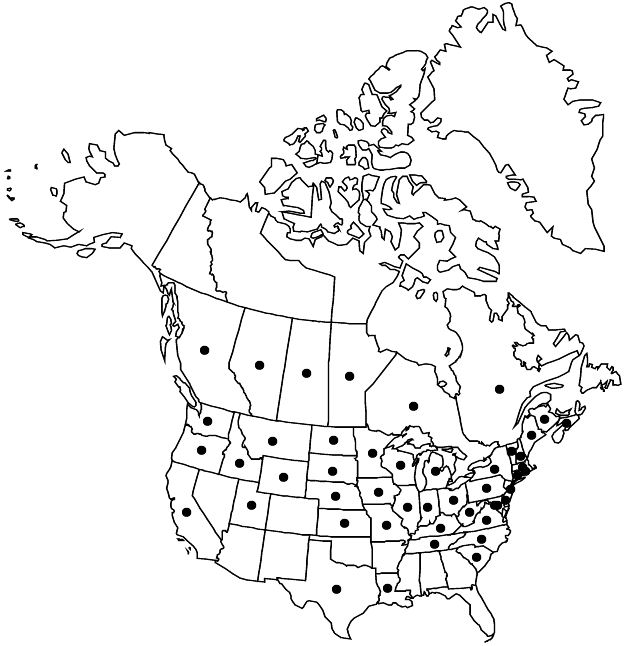Difference between revisions of "Malva sylvestris"
Sp. Pl. 2: 689. 1753.
FNA>Volume Importer |
imported>Volume Importer |
||
| (4 intermediate revisions by 2 users not shown) | |||
| Line 19: | Line 19: | ||
|name=Malva mauritiana | |name=Malva mauritiana | ||
|authority=Linnaeus | |authority=Linnaeus | ||
| + | |rank=species | ||
}} {{Treatment/ID/Synonym | }} {{Treatment/ID/Synonym | ||
|name=M. sylvestris var. mauritiana | |name=M. sylvestris var. mauritiana | ||
|authority=(Linnaeus) Boissier | |authority=(Linnaeus) Boissier | ||
| + | |rank=variety | ||
}} | }} | ||
|hierarchy=Malvaceae;Malvaceae subfam. Malvoideae;Malva;Malva sylvestris | |hierarchy=Malvaceae;Malvaceae subfam. Malvoideae;Malva;Malva sylvestris | ||
| Line 37: | Line 39: | ||
|elevation=0–1000 m | |elevation=0–1000 m | ||
|distribution=Alta.;B.C.;Man.;N.B.;N.S.;Ont.;Que.;Sask.;Calif.;Conn.;Del.;D.C.;Idaho;Ill.;Ind.;Iowa;Kans.;Ky.;La.;Maine;Md.;Mass.;Mich.;Minn.;Mo.;Mont.;Nebr.;N.H.;N.J.;N.Y.;N.C.;N.Dak.;Ohio;Oreg.;Pa.;R.I.;S.C.;S.Dak.;Tenn.;Tex.;Utah;Vt.;Va.;Wash.;W.Va.;Wis.;Wyo.;Europe;temperate Asia;n Africa;introduced also in Mexico;Central America (Guatemala;Honduras);South America (Argentina;Brazil;Colombia;Ecuador;Peru;Venezuela);Pacific Islands (New Zealand);Australia. | |distribution=Alta.;B.C.;Man.;N.B.;N.S.;Ont.;Que.;Sask.;Calif.;Conn.;Del.;D.C.;Idaho;Ill.;Ind.;Iowa;Kans.;Ky.;La.;Maine;Md.;Mass.;Mich.;Minn.;Mo.;Mont.;Nebr.;N.H.;N.J.;N.Y.;N.C.;N.Dak.;Ohio;Oreg.;Pa.;R.I.;S.C.;S.Dak.;Tenn.;Tex.;Utah;Vt.;Va.;Wash.;W.Va.;Wis.;Wyo.;Europe;temperate Asia;n Africa;introduced also in Mexico;Central America (Guatemala;Honduras);South America (Argentina;Brazil;Colombia;Ecuador;Peru;Venezuela);Pacific Islands (New Zealand);Australia. | ||
| + | |introduced=true | ||
|discussion=<p><i>Malva sylvestris</i> is native throughout Europe except in the extreme north and into temperate Asia and northern Africa and is widely cultivated for food and ornament. It is the most commonly cultivated <i>Malva</i> in most of the</p><!-- | |discussion=<p><i>Malva sylvestris</i> is native throughout Europe except in the extreme north and into temperate Asia and northern Africa and is widely cultivated for food and ornament. It is the most commonly cultivated <i>Malva</i> in most of the</p><!-- | ||
--><p>United States. It is not very tolerant of hot, arid conditions. It is variable in habit, indument, leaf shape, and corolla size and color; most variants originated as selections/cultivars. The flowers and fruits indicate its close relationship with <i>M. nicaeensis</i>; the upright habit and much larger flowers allow an easy distinction.</p> | --><p>United States. It is not very tolerant of hot, arid conditions. It is variable in habit, indument, leaf shape, and corolla size and color; most variants originated as selections/cultivars. The flowers and fruits indicate its close relationship with <i>M. nicaeensis</i>; the upright habit and much larger flowers allow an easy distinction.</p> | ||
| Line 47: | Line 50: | ||
-->{{#Taxon: | -->{{#Taxon: | ||
name=Malva sylvestris | name=Malva sylvestris | ||
| − | |||
|authority=Linnaeus | |authority=Linnaeus | ||
|rank=species | |rank=species | ||
| Line 63: | Line 65: | ||
|publication year=1753 | |publication year=1753 | ||
|special status=Introduced;Weedy | |special status=Introduced;Weedy | ||
| − | |source xml=https:// | + | |source xml=https://bitbucket.org/aafc-mbb/fna-data-curation/src/2e0870ddd59836b60bcf96646a41e87ea5a5943a/coarse_grained_fna_xml/V6/V6_532.xml |
|subfamily=Malvaceae subfam. Malvoideae | |subfamily=Malvaceae subfam. Malvoideae | ||
|genus=Malva | |genus=Malva | ||
Latest revision as of 23:21, 5 November 2020
Herbs, annual, biennial, or perennial, 0.5—1.5(–3) m, hairy to glabrate, hairs simple and stellate. Stems erect or ascending, glabrous or sparsely hairy, hairs both simple and stellate. Leaves: stipules persistent, lanceolate to ovate-triangular, 3–5(–8) × 3 mm; petiole 1/2 to 1 1/2 times as long as blade, pubescent in adaxial groove, otherwise glabrous; blade reniform to suborbiculate-cordate, unlobed or shallowly 3–7-lobed, sinuses to 1/2 to base, (2–)5–10(–14) × (2–)5–10(–14) cm, base cordate to ± truncate, lobes semicircular to oblong, margins crenate, apex rounded to wide-acute, surfaces glabrous or sparsely hairy, hairs simple or stellate. Inflorescences axillary, flowers solitary or in 2–4-flowered fascicles, long-stalked. Pedicels 1–2.5 cm, 1–4.5 cm in fruit, much longer than calyx, glabrous or sparsely stellate-hairy; involucellar bractlets distinct, sometimes adnate to calyx in basal 1 mm, oblong-lanceolate to elliptic or narrowly obovate, reticulate-veined, (3–)4–5(–7) × 2.5–4 mm, shorter than calyx, margins entire, surfaces glabrous, sparsely ciliate. Flowers: calyx reticulate-veined, 5–6 mm, to 10 mm in fruit, lobes incompletely enclosing mericarps, stellate-puberulent; petals pink to purple or reddish purple with darker veins, usually drying blue, (12–)16–30(–45) mm, length 2 1/2–3(–4) times calyx; staminal column 5 mm, minutely, retrorsely stellate-puberulent; style 10–12-branched; stigmas 10–12. Schizocarps 7 mm diam.; mericarps 10–12, 2–2.5 mm, margins sharp, not winged, sides thin and papery, with radiating veins, surface strongly to obscurely reticulate-wrinkled, usually glabrous, sometimes sparsely hairy. Seeds 1.5–2.2 mm. 2n = 42.
Phenology: Flowering mostly Apr–Oct.
Habitat: Disturbed areas, roadsides, farm yards, pastures
Elevation: 0–1000 m
Distribution

Introduced; Alta., B.C., Man., N.B., N.S., Ont., Que., Sask., Calif., Conn., Del., D.C., Idaho, Ill., Ind., Iowa, Kans., Ky., La., Maine, Md., Mass., Mich., Minn., Mo., Mont., Nebr., N.H., N.J., N.Y., N.C., N.Dak., Ohio, Oreg., Pa., R.I., S.C., S.Dak., Tenn., Tex., Utah, Vt., Va., Wash., W.Va., Wis., Wyo., Europe, temperate Asia, n Africa, introduced also in Mexico, Central America (Guatemala, Honduras), South America (Argentina, Brazil, Colombia, Ecuador, Peru, Venezuela), Pacific Islands (New Zealand), Australia.
Discussion
Malva sylvestris is native throughout Europe except in the extreme north and into temperate Asia and northern Africa and is widely cultivated for food and ornament. It is the most commonly cultivated Malva in most of the
United States. It is not very tolerant of hot, arid conditions. It is variable in habit, indument, leaf shape, and corolla size and color; most variants originated as selections/cultivars. The flowers and fruits indicate its close relationship with M. nicaeensis; the upright habit and much larger flowers allow an easy distinction.
Selected References
None.